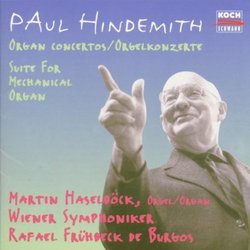| All Artists: Hindemith, Haselbock, Vienna Symphony Title: Organ Concerto Members Wishing: 0 Total Copies: 0 Label: Koch Schwann (Germ.) Release Date: 7/18/1995 Genre: Classical Styles: Forms & Genres, Concertos Number of Discs: 1 SwapaCD Credits: 1 UPC: 099923120223 |
Search - Hindemith, Haselbock, Vienna Symphony :: Organ Concerto
 | Hindemith, Haselbock, Vienna Symphony Organ Concerto Genre: Classical
|
Larger Image |
CD Details |
CD ReviewsBest version of the 1962 Organ Concerto Martin Selbrede | The Woodlands, Texas | 01/31/2006 (5 out of 5 stars) "Before acquiring this, I enjoyed the only other version of the 1962 Organ Concerto of Hindemith's conducted by Werner Andreas Albert (also linked with the 7th Kammermusik -- only the 3rd element in the setlist differs between Albert's CD and this one, with Albert going for the Viola d'Amore Kammermusik while this CD hits the rare mechanical organ works of Hindemith). This version was an absolute eye-opener: as if listening to the work totally fresh. Phrases were shaped and had character. Lines were clear, strong, easy to differentiate from the other textures, and subtle or powerful as required. Truly amazing that a work I'd already come to know and love suddenly takes brand new shape -- the difference in the versions can only be compared to the difference between black and white television and color HDTV. Some of the sonic differences may reflect hall acoustics and engineering, but the interpretation is simply more alive as well. Astonishing. I have no idea why this brilliant version of the concerto went out of print, it is so superior to the Albert version. There is a depth to the solo organ playing, particularly in quiet passages where the dynamics aren't flattened (as they appear to be in Albert if only by comparison with de Burgos).
These differences are most noticeable in the first three movements; one can see that Albert brings out several details in the finale that aren't as obvious in the de Burgos reading (which, apart from other differences, takes a slightly slower tempo for the last movement at the outset). Albert emphasizes the dissonant clashes that de Burgos tends to treat as incidental to other lines. However, so many details obscured in the Albert sing loud and clear in the de Burgos -- important lines in the strings I never even knew were there. In the cadenza, organist Martin Haselboeck makes it easy to hear the main theme (Veni Creator Spiritus) rather than permitting it to be buried in the surrounding textures. The lead-out from the cadenza into the string passage is far more emotionally rendered than on the Albert CD. However, Albert does far more justice to the final 2 minutes: here, he emphasizes the right things, while de Burgos regrettably puts the woodwinds too heavily into the forefront, so we lose some of the expertly voiced brass writing Hindemith had positioned at the foundation of this sequence. The broken triplet string figures are magical for Albert, but de Burgos here is the perfunctory version. On the 7th Kammermusik, pride of place still goes to Chailly's reading, followed very closely by the old Telefunken LP version with Concerto Amsterdam. But this comes in a very strong 3rd, and again we have the benefit of the similar acoustics that captured the later concerto so well on the first 4 tracks (although the hall is reportedly a different hall). Here we have Haselboeck playing the organ AND conducting the work. We see that, like de Burgos, Haselboeck is no slouch in music-making either. These readings make me wonder whether Haselboeck has committed Hindemiths' three organ sonatas to CD as well -- if so, they'd also be strong contenders based on Haselboeck's work here. The Suite for a Mechanical Organ, using Welte rolls that Hindemith hand punched, is rendered in analog mono sound (it's a historic recording). Sometimes it sounds like someone who's had too much espresso playing a calliope: wild sequences of runs followed by fascinating dotted rhythms (here sounding fresh, unlike their worn-out appearance in so much later Hindemith). One can consider this the first MIDI work ever done, and it is brilliant. Note that the mechanical organ has major percussion capability - the 2nd movement focuses on such voicings. There are vast stretches where, if it weren't for the dated sonics, you'd think you were listening to some particularly inventive electronic work of the 1990s with unflagging energy and forward propulsion. There's nothing conservative about this virtuoso work. Apparently one of the best kept secrets in modern music, this. The organist appeared to have written most of the program notes in the CD booklet. The notes are informative, and I only noted one apparent error (the flutes in the 3rd movement of the 1962 concerto are said to be double-tongued, but in reality they are playing flutter-tongued runs, as correctly noted in the Albert program notes). Highly recommended for the lover of high integrity modern composition for the organ and orchestra, and, of course, for those who hold Hindemith's works in high esteem. This album has the goods." |

 Track Listings (12) - Disc #1
Track Listings (12) - Disc #1